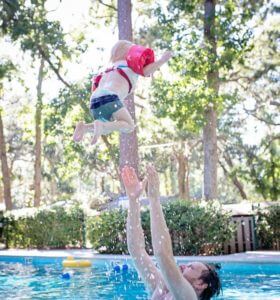Developmental spurts in your baby are especially important. Little by little, your baby learns new things. Look forward to the next few weeks and seeing how your baby develops from week 19. Find out what challenges await you and your baby here.
Table of contents
Baby 19 Weeks: Growth Spurt
The 19 week push is the fourth growth spurt of a total of eight major developmental spurts in the first year of life. This growth spurt brings a really big change. The leap from a helpless little baby to a toddler is now imminent.
In this phase, your baby discovers its own hands. He puts his fists in his mouth and grabs everything that is nearby. When your baby is 19 weeks old, the ability to see and perceive continues to develop. At this stage of development, your offspring responds to its own reflection and name.
Remember, each child develops at his or her own pace. Your baby does not have to be able to do everything right away. So don’t put pressure on yourself about the order of your baby’s development. In addition, some children prefer to develop quietly and don’t let on.
Growth Spurt: What Are The Signs?
During this phase of development, your baby is growing a lot. During this growth spurt, you often notice, for example, that the cap is too small or the onesie no longer fits. Common signs can be sleep problems that cause restless nights. Constant hunger or refusal to eat are also symptoms of the fourth growth spurt. Your baby cries more often and may suffer from sensitive gums. It produces increased salivation and bites at things.
Development: What Is Your Baby Learning?
When your baby is 19 weeks old, the oral phase begins. Your offspring wants to Grab things with their hands and put them in their mouth to explore them. During this developmental stage, your baby rarely misses when he or she touches something. They can also grasp things with one hand and switch toys from one hand to the other.
Your baby learns at 19 weeks that smooth transitions can involve multiple actions and become one event. For example, the ball can now bounce and jump instead of rolling from A to B as before.
Your nestling can observe everyday things with great pleasure in this phase. Be it, for example, when you run across the apartment and vacuum.
But when your baby is 19 weeks old, he or she can now create their own events. For example, he notices that a toy makes a noise when he bangs it on the table or throws it on the floor.
Through a sequence of events, your baby can now understand certain actions understand. For example, if an object disappears behind your back, your baby will know your baby knows that it is not just gone. He starts looking for the object and waits for it to reappear and waits for it to reappear.
Often peek-a-boo games are played during this developmental leap. You can animate your offspring to watch enthusiastically with this gimmick. Be it, you make toys disappear and reappear.
If your baby is 19 weeks old, it reacts to its own reflection. Either your baby laughs your baby or is afraid, as if of a stranger. In addition, your offspring tries, Hand movements or sounds.
If your baby is fit at 19 weeks motor Development is already able to turn from the supine to the lateral position and perhaps already on the belly turn. As well as in the prone position already Arms out in the prone position. This process is also part of a sequence of smooth transitions. During this growth spurt, your offspring will move more forward and backward forward and backward during this growth spurt, indicating that it will soon be soon.
The newly learned events also make Language development further progress. Your baby can make sounds in a sequence at 19 weeks that already sound almost like sentences sound. More and more consonants appear. For example, the “PFFF” when spitting out the porridge.
How Long Does The 19-Week Stage Last?
Your baby’s 19-week push is the longest of eight major developmental pushes. This one often lasts four to six weeks for many babies.
Challenges: What Can You And Your Baby Expect?
When your baby is 19 weeks old, a new challenge comes your way. The so-called 19-week surge throws your baby off balance. During these weeks, you’ll probably have an unhappy baby. This developmental spurt lasts for a few weeks and can be exhausting. During this time, your baby will also need closeness, but also variety.
When your baby is 19 weeks, you can usually start feeding him or her formula. You should gradually replace the usual milk meals with different foods in the formula in the baby food. You should make sure that this is done Step by step.
If you have breastfed your baby before, this adaptation may take some time Take some time. Since breastfeeding was a focal point of your life, a familiar source of closeness, warmth, and comfort. Your baby may be shaken by the abrupt weaning Faltering.
Give your baby the time he or she needs to get used to the change. Try not to stress or put pressure on yourself. Often you may have to try different foods to see what your baby likes or doesn’t like.
It can also happen that the first signs of teething appear. Dental care starts even before the first tooth appears.
What Should You Keep In Mind During The 19 Week Push?
During the 19-week push, you should be especially careful that your baby does not eat small Baby does not put small parts or poisonous things in his mouth. To reduce the risk of swallowing or poisoning. It is now time to you childproof your home during this developmental stage.
Baby 19 Weeks: Important Events
Breastfeeding
The Federal Center for Health Education recommends that you start feeding your baby the fourth month at the earliest and no later than the beginning of the seventh month Of the month at the latest.
Before you start feeding, you should think about a baby food plan beforehand A baby food plan. The first one should be a vegetable porridge and it should be prepared in an age-appropriate way.
Make sure that you avoid sugar and sweeteners, salt, flavor enhancers, and stabilizer additives. Observe whether your child tolerates the foods. If he reacts to constipation or diarrhea, it shows that the intestine is not yet sufficiently mature. In this case, you should return to the formula for a few weeks and try again later.
Teething
When your baby is 19 weeks, the first signs of teething may appear. However, this can take until the sixth month. Typical signs of teething are:
- Increased Salivation.
- Sensitive Gums.
- Biting and chewing on things or also at the breast.
- Refusal to eat.
- Restlessness and crying seemingly without reason.
- Sleeping problems.
Remember that the care of teeth begins before the first tooth. You should therefore avoid sugary drinks.
Baby 19 Weeks Old: Height, Weight And Clothing Size
You can find in the size chart how big and heavy your baby can be on average at 19 weeks and which clothing size is the right one.
| Size | Girl 56 to 70 cm | Boys 56 to 70 cm |
| Weight | about 6.900 g | about 7.500 g |
| Gain | 70 to 140 g | 70 to 140 g |
| Clothes/ Romper | Size 68 | Size 68 |
| Caps | Size 41-43 | Size 41-43 |
| Socks | Size 15-17 | Size 15-17 |
Please note: These are average values! These can vary from child to child, as each child develops differently.
From Infant To Toddler
Your Baby has made an enormous growth spurt at 19 weeks. During this stage, you can look at picture books or photos with your child. But also Name objects and people. The more often you repeat these, the sooner your child will soon be able to remember some words. Since your baby also learns new sounds, you can use different types of music to find out what kind of music your child responds to.
You record the first sounds or reactions in a memory book or on video or record them on video. When your child starts to teethe, you can keep track of the sequence of teeth with the help of a dental calendar. This way you still have a nice memory even years later.
Sources
https://www.hallo-eltern.de/baby/baby-19-wochen-alt/
https://www.gofeminin.de/baby/wachstumsschub-baby-s1155611.html
https://www.swissmom.ch/baby/medizinisches/beim-kinderarzt/die-wachstumsschuebe/4-wachstumsschub/










